Having lived, traveled, studied, and worked abroad, I’ve spent my fair share of time sampling new experiences and perspectives around the globe. I’ve also spent a lot of time interacting with other travelers, from tourists on vacation to full-fledged expats who are searching for … something. For half of my life now – since my first time in the southern hemisphere – I have made value judgments about the “how” and “why” aspects of other people’s travel, but my second time below the equator this spring had me re-evaluating some of those beliefs, notably whether “tourism” is a bad word and whether the search for “authenticity” is achievable.
New Horizons
As I loaded up my backpack on New Year’s Day during my sophomore year of college, I remember practically vibrating with excitement about my imminent journey off the beaten track, learning from people I would never otherwise meet, in a country where no one in my family had previously traveled. My mom had bought me a star map for Christmas, since even the sky would be different from what I knew back home, and I left plenty of room among my hiking clothes for my tripod, extra lenses, and 30 rolls of film (all of which got used that month). Fittingly, “Southern Cross” by Crosby, Stills & Nash played on the radio, [1] absolutely cementing my belief that world travel is essential to living a full life.
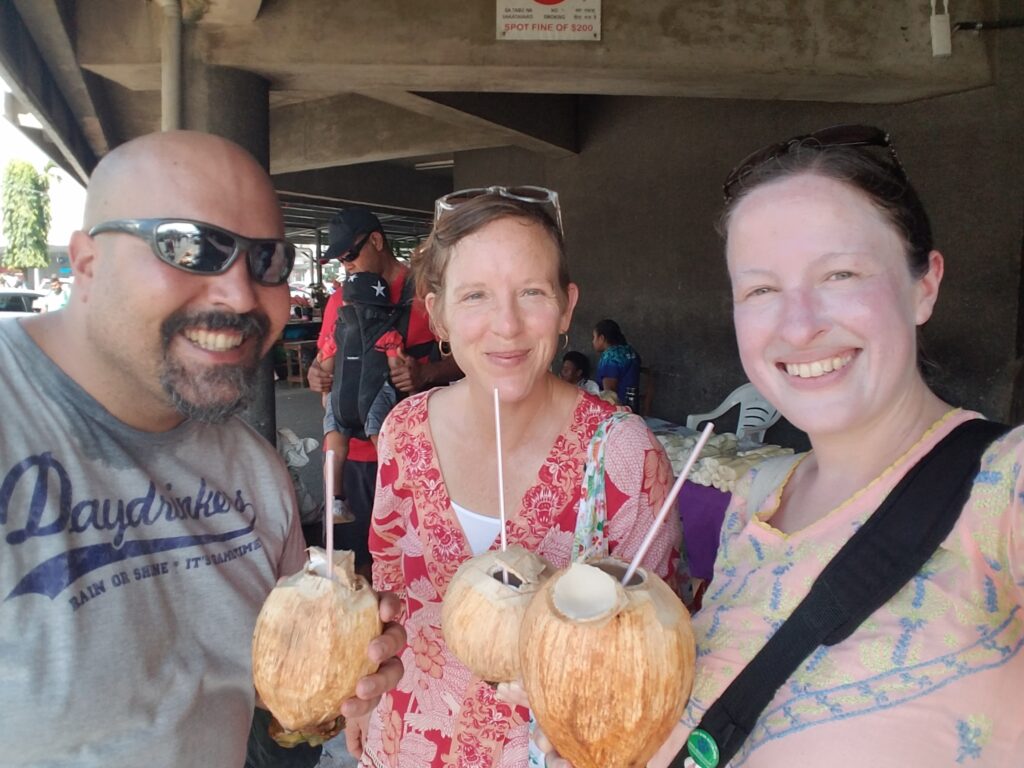
Twenty years (and three months) later, I saw the Southern Cross for the second time, as a fundamentally different person – no less in love with travel, but with a perspective tempered by experience and introspection. Knowing that my presence as a tourist represents a mixed bag of tourism revenue, increased carbon footprint, learning opportunities, and various aspects of exploitation, I am now at the point when I need to ask why travel is so important to me. This answer isn’t the same for everyone, but for me travel helps me find excitement through new experiences, expand my perspectives and my comfort zone, learn through authentic connection with others, and ultimately remember why I do the work I do.
Not everyone seeks adventure to the level I do when they travel, and I will say – for the record – that that’s OK. Not everyone wants to get challenge and growth out of travel; some people just need down-time. It has taken me a long time to arrive at this point after many years of judging people who don’t suck the marrow out of their vacations and idolizing people who don’t stop moving. Part of the reason why I push as hard as I do is because I think – generally – it can be challenging to get authentic experiences when traveling (i.e. you need to go farther off the beaten path), so therefore harder must equal better. But a question posed by Gretchen, the woman who designed our leadership program, while we were in Fiji shook me to my core: is it even possible to have a truly authentic experience?
The Search for Authenticity
Gretchen and I chatted about this concept as Christian led us around the municipal market in Suva, down the road from our hotel the day after our program ended. While our cohort was in class all week, Christian was being a tourist – checking out restaurants, talking with locals, taking a walking tour around town. His week in Suva was a fundamentally different experience than ours as we met with leaders from government, business, and local communities [2] but also a fundamentally different experience than that of the hundreds of tourists who poured off a cruise ship for a few hours one day mid-week and bought souvenirs in the overpriced, air conditioned mall. Because of his time testing the waters with a few tourist activities, Christian was able to guide us to some of the more authentic locations and away from the tourist traps once we had a few hours to venture out on our own.
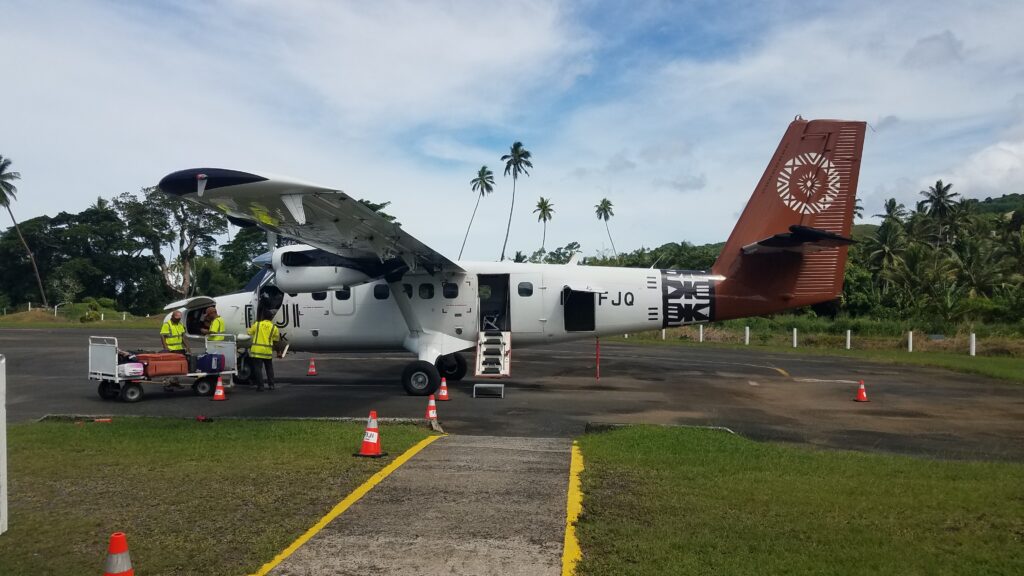
The Suva municipal market, with craftspeople selling their wares in cramped, stuffy stalls, and rats running in between the tables piled high with fresh produce, was absolutely one of the more authentic experiences we would ultimately be able to have – fundamentally because the market was there largely for locals, not tourists. But most experiences we ultimately had in the coming week (including the “authentic” ones), existed as opportunities for us largely because of us, because tourists would come take part. Reminiscent of Heisenberg’s Uncertainty Principle, the act of observation changes the outcome: simply being present to observe something transforms what might otherwise be authentic behavior into performance.
Nineteen-year-old Alison would have been devastated to hear such words, and 39-year-old Alison was at the very least dismayed by the concept. But grappling with Gretchen’s question ultimately resulted in a new perspective for me: if authenticity is fundamentally not possible, that actually takes the pressure off those of us who have been chasing it. We can absolutely still search for more authentic experiences, but the question can shift from “is this authentic?” to “what do I hope for as a result of being in this situation?” – and that sounds like the question the author of the previously referenced New Yorker article should be posing, rather than baiting readers with the implication that travel has no inherent value. [3]
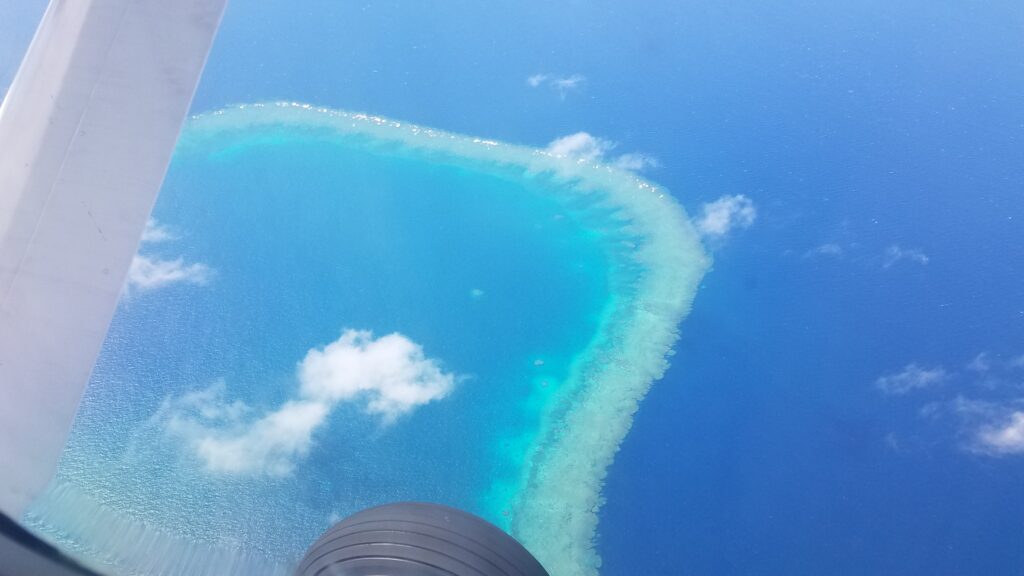
Over the Top
Of course, I’m coming to these realizations post-Fiji, meaning that our Fiji plans were still largely influenced by my desire for maximum authenticity and minimum tourist presence. And in full honesty, that style of travel – at least in a developing country – is something I have not done in over 15 years, and never with someone else in tow who will bear the consequences of any adventurous decisions on my part. Christian was an absolute trooper through several challenging situations (and may have ultimately weathered those challenges better if they hadn’t been coupled with a severe waterborne illness), but I do fear that my flavor of adventure left a bad taste in his mouth.
After our Saturday in Suva, with its walk to the municipal market and ill-fated dip in a nearby waterfall, we left Viti Levu (the main island) for Vanua Levu (the second-largest island). I hadn’t realized how limited our travel options would be on the sabbath day, and we ultimately couldn’t catch a ferry. My classmate from Fiji said that was a good thing and strongly encouraged us to fly regardless, since the ferries are slow and sometimes hit the reefs. Our Sunday morning flight was small enough that after the airline staff weighed our bags, they weighed us and assigned our seats to ensure proper distribution of mass. After a very cramped, warm, and loud 30 minutes gazing down at iridescent reefs through a spinning propeller blade, we landed in Savusavu.
My brand of adventure would have had us taking a cab from the Savusavu airport to a local bar and asking around for recommendations on where to stay the night. It was only a day or two before leaving Suva when Christian realized that was my plan, and we quickly arranged a stay through Booking.com instead. [4] I insisted we avoid anything resembling a resort, of which there were several; we were instead able to find a guest house rental farther down the road from what seemed to be the resort area. After landing, we called a cab to pick us up from the one-gate, open-air landing strip of an airport, and we didn’t know at the time what a feat it was to procure a cab.
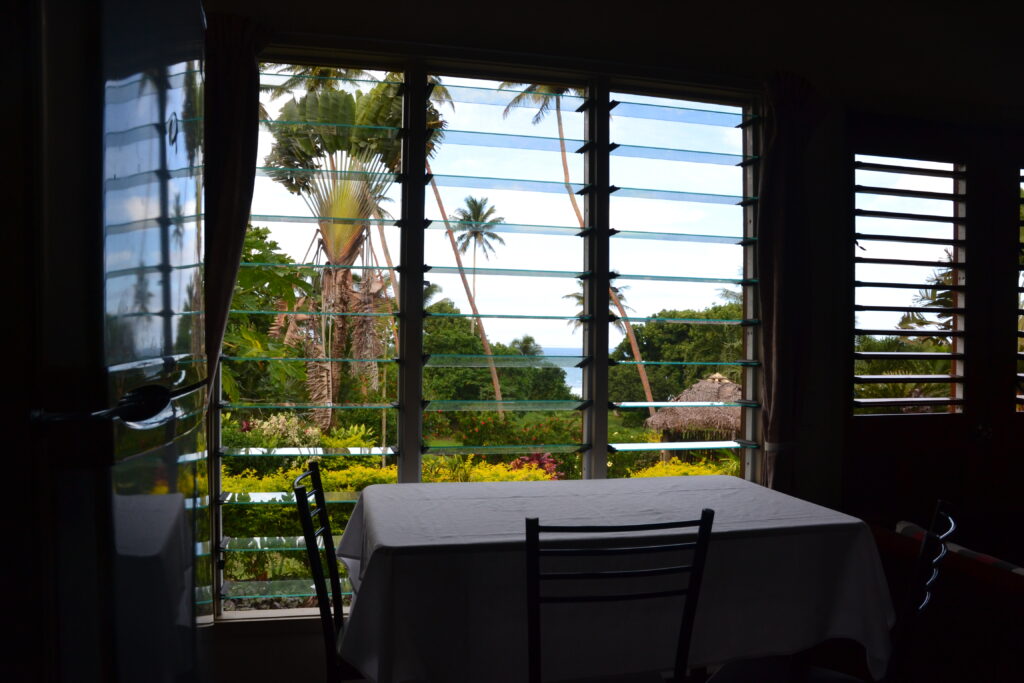
As the Locals Do
Our host Clark welcomed us with a big binder of things to do in the area, including a lot of nature tourism (e.g. snorkeling, diving, boating, hiking, biking, ATV tours, and parasailing). We had brought our own snorkeling equipment and spent the afternoon seeing what we could in the receding tide, but we would have better luck the next morning. He also told us that there was a choir performance at the nearby resort that evening – I was a little skeptical after our “authentic” luau experience on Maui, [5] but the resort was also the only place nearby to get drinks or dinner, so he called us a cab. The cab driver continued extending his expected time of arrival until it was clear that we wouldn’t make it to the performance or even to any open restaurant. Clark clearly felt bad about our limited options, so we wound up spending the evening with him and his mother Brenda at her house – and that ultimately proved to be the best night of our entire vacation.
Even before it was clear that our cab was never coming, I was sitting on Brenda’s porch, getting a ukulele lesson from Clark in a late afternoon rainstorm. Christian appeared at the table, as did some snacks and drinks. Brenda explained that the property has been in her family since World War II, when New Zealand was tasked with Fiji’s defense. [6] We told stories about travel, talked climate change, and mused over our grand purpose in the universe. Over the course of several drinks and some defrosted Indian food, the sun sank in the west, cat-sized bats flew to and from the surrounding palm trees looking for food, and stars began to twinkle one by one until I could see the Southern Cross framed perfectly in the middle of our view from the large wooden porch.
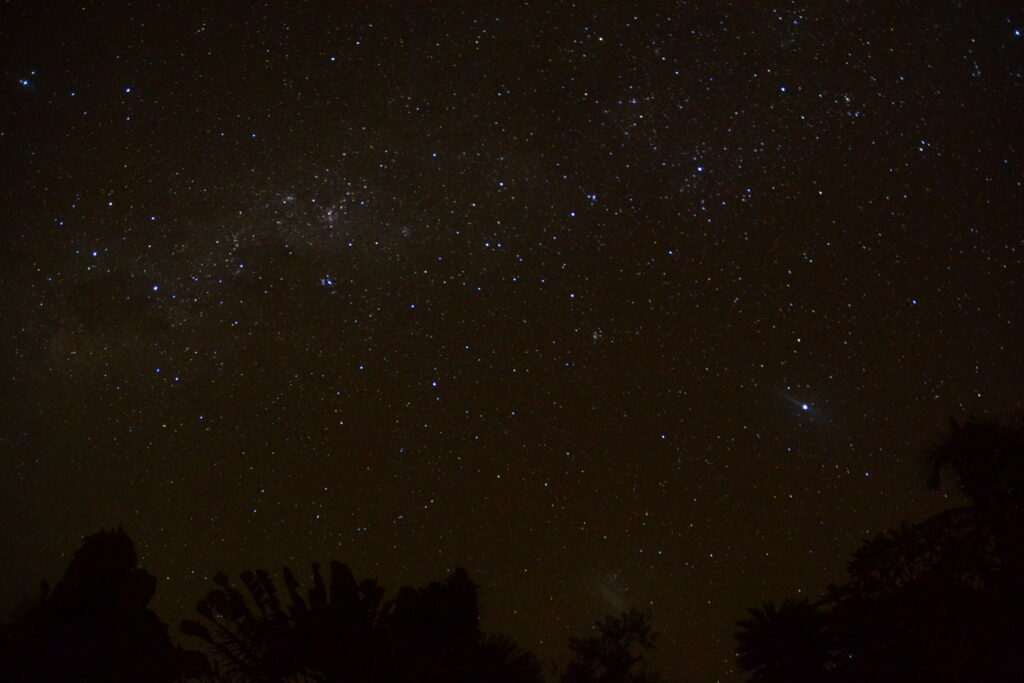
Of course our experience that evening (and throughout our whole stay on Vanua Levu) involved Clark and Brenda playing the role of hosts to Christian and me, who were playing the role of tourists. But, tourists or not, it was without a doubt the most genuine interaction that we had with any locals during our entire vacation week. And while it was not a more traditional Fijian experience, neither was it lost on me that this genuine interaction took place while we were notably not attending something intended to be an authentic experience for tourists.
~
The coming days would prove challenging in different ways, even while we were taking part in ostensibly “easier,” more touristy activities, but there will be more on that next week.
In the meantime, thanks for reading!
[1] https://www.youtube.com/watch?v=IHL-6cUtZj0
[2] https://radicalmoderate.online/climate-lab-fiji-in-the-classroom/
[3] https://www.newyorker.com/culture/the-weekend-essay/the-case-against-travel
[4] https://www.booking.com/hotel/fj/vosa-ni-ua.html?aid=304142
[5] https://radicalmoderate.online/kokua-for-maui/
[6] https://teara.govt.nz/en/fijians/print
1 Comment
rjwarren59c8cb9109c0 · September 29, 2024 at 9:31 pm
Such a beautiful story. I get so lost and see the states myself. I have traveled a bit in my time. Not a farm as you, but those trips are a life time off sweet memories. I like going off the beaten path. That is where life begins❤️
Beautiful work❤️
A.B.